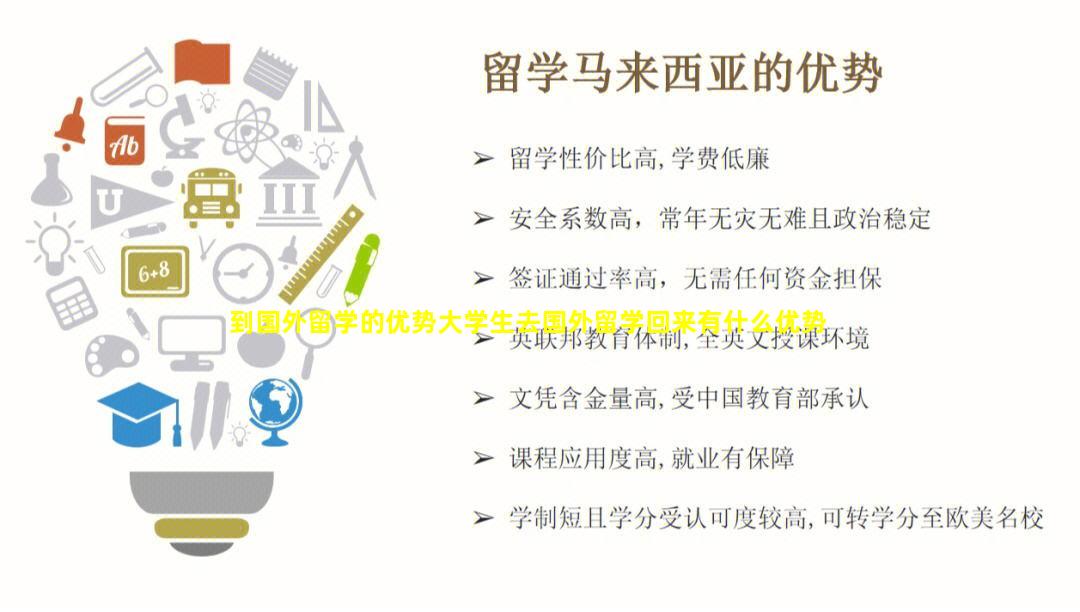 锦泰留学网
锦泰留学网到国外留学的优势 大学生去国外留学回来有什么优势
 匿名用户
匿名用户
到国外留学有许多优势,其中包括:

1. 教育质量:国外的大学和教育机构通常拥有高水平的教学质量和声誉,提供丰富多样的学科选择和先进的教育方法。
2. 学术研究机会:国外的大学通常有更多的科研设施和资源,提供学生参与研究项目的机会,从而提升学生在学术领域的能力和经验。
3. 国际化经验:留学生可以与来自世界各地的学生互动和交流,增加跨文化交流和沟通能力,拓宽国际视野。
4. 语言能力提升:留学生必须用外语进行学习和生活,提升了语言能力和流利度,增加了就业竞争力。
5. 拓宽就业机会:留学经历可以在就业市场上增加竞争力和市场价值,吸引潜在雇主的注意,尤其是针对国际企业和跨国公司。
6. 个人成长:留学经历可以帮助学生独立生活和承担责任,培养自信心和自律能力。
7. 文化体验:留学生能够亲身体验不同国家的文化、风俗和传统,拓宽见识。
8. 网络与人脉:在国外留学期间,学生会与各行业的专业人士、导师和同行建立联系,为以后的职业发展提供有益的人脉资源。
到国外留学可以提供高质量的教育、国际化的经验以及更广阔的发展机会,使学生充分发展自身潜力,为未来职业生涯打下良好基础。
大学生去国外留学回来有以下几个优势:
1. 国际化视野:留学生在国外学习生活期间,会接触到不同的文化、价值观和思维方式。他们有机会了解不同国家的教育体系和商业环境,从而拓宽了自己的视野。这种国际化视野使得他们更加开放和适应性强,更能在跨国企业或跨文化环境下工作。
2. 外语能力:留学生在国外时会接触到目标语言的生活环境,并有机会进行语言沟通和实践。这种经历使他们的外语能力得到大幅度提升,能够流利地使用目标语言,甚至具备双语或多语能力。这对于今后从事跨国公司、外贸、外交等国际交流工作非常有利。
3. 学术与专业知识:留学生在国外的大学或研究机构学习期间,往往能够接触到更加先进的教育和学术资源,有机会与世界级教授或研究者进行学术交流。他们通过学术研究和实践项目,能够获得更深入的专业知识和技能。这为他们未来的职业发展奠定了坚实基础。
4. 人际网络:留学生在国外的学习生活期间,能够结识来自世界各地的同学和导师,建立起广泛的人际网络。这些人际关系在毕业后起到重要的作用,可以提供就业机会、合作伙伴和商业资源等。这种广泛的人际网络对于职业发展和个人成长都具有积极影响。
大学生去国外留学回来可以获得国际化视野、外语能力、学术与专业知识以及人际网络等优势,这些都能够增加他们的就业竞争力和职业发展的机会。
Advantages and Disadvantages of Studying Abroad
Studying abroad has become increasingly popular in recent years, with more and more students choosing to pursue their education in foreign countries. This trend can be attributed to a number of advantages that studying abroad offers. However, it is important to recognize that there are also some disadvantages associated with this decision.
One of the main advantages of studying abroad is the opportunity to experience a different culture. Living in a foreign country allows students to immerse themselves in a completely new environment, learn about different customs and traditions, and broaden their horizons. This cultural exposure can greatly enhance a student's understanding and appreciation of diversity, and provide them with a global perspective that can be valuable in an increasingly interconnected world.
Another advantage of studying abroad is the chance to improve language skills. Many students choose to study in English-speaking countries to enhance their English proficiency, which is highly valued in today's global job market. Immersion in a foreign language environment enables students to practice their language skills on a daily basis, leading to significant improvements in fluency and communication abilities.
Furthermore, studying abroad often provides access to high-quality education. Many renowned universities around the world offer excellent academic programs and cutting-edge research opportunities. By studying at such institutions, students can benefit from exposure to leading scholars and experts in their fields, as well as gain access to advanced resources and facilities. This can have a positive impact on future academic and career prospects.
Despite these advantages, there are also some disadvantages associated with studying abroad. One major drawback is the high cost involved. Tuition fees, living expenses, and travel costs can be significant, and not everyone can afford to bear such expenses. Additionally, being far away from home can be emotionally challenging for some students. Being away from family, friends, and the familiar can lead to feelings of homesickness and loneliness.
Furthermore, studying abroad may also pose some difficulties in terms of adapting to a different education system and teaching methods. The grading criteria, workload, and expectations may differ from what students are accustomed to in their home countries. This can initially be overwhelming and require adjustment and adaptation.
In conclusion, studying abroad offers many advantages, such as exposure to different cultures, language improvement, and access to quality education. However, it is important to be aware of the associated disadvantages, including high costs and emotional challenges. Ultimately, the decision to study abroad should be carefully considered and weighed against individual goals, circumstances, and resources.
国外留学和国内考研各有其优势,具体取决于个人的目标和情况。
国外留学的优势包括:
1. 教育体系和资源:国外大学普遍拥有更丰富的教育资源和先进的教学方法,可以提供更广泛且国际化的学习机会。
2. 学术研究机会:国外大学在科研和学术领域有更多的机会,能够接触到创新和前沿的研究领域。
3. 外语学习机会:留学可以提供更多与外语环境接触的机会,提高外语水平。
4. 国际视野和人际关系网络:留学可以增加与来自世界各地的学生及教授的互动机会,提升自己的国际化视野和人际关系网络。
国内考研的优势包括:
1. 成本和时间:相对于国外留学,国内考研的成本和时间成本较低,对于资金和时间有限的人来说是一种经济实惠的选择。
2. 就业就近和语言优势:国内考研可以更方便地就业就近,且不需要面临外语沟通障碍。
3. 专业深耕和考试准备:国内考研侧重于专业知识的深入学习和备考,对于未来深耕某一专业或进入相关领域有一定优势。
最终选择是需要考虑个人的目标和情况的,在做决策之前,建议对两个选项进行详细的了解和权衡。
相关问题
 匿名用户 2025-07-06
匿名用户 2025-07-06 匿名用户 2025-07-06
匿名用户 2025-07-06 匿名用户 2025-07-06
匿名用户 2025-07-06 匿名用户 2025-07-05
匿名用户 2025-07-05 匿名用户 2025-07-05
匿名用户 2025-07-05 匿名用户 2025-06-28
匿名用户 2025-06-28 匿名用户 2025-06-22
匿名用户 2025-06-22 匿名用户 2025-06-18
匿名用户 2025-06-18 匿名用户 2025-06-18
匿名用户 2025-06-18 匿名用户 2025-06-16
匿名用户 2025-06-16